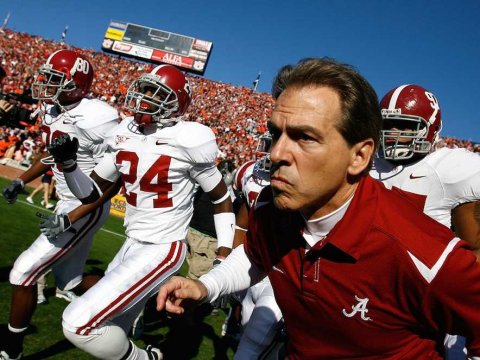 We know, you’re asking yourself, what does Alabama Football coach Nick Saban have to do with Harlem? Well, Harlem is about being your best, and coach Saban gives us some insight into his strategy for getting the best out of his assistants and players.
We know, you’re asking yourself, what does Alabama Football coach Nick Saban have to do with Harlem? Well, Harlem is about being your best, and coach Saban gives us some insight into his strategy for getting the best out of his assistants and players.
He’s more successful than most coaches, in part, because he doesn’t think like the competition. His guiding philosophy is known as The Process, a way of breaking down a difficult situation into manageable pieces.
In new book “The Obstacle Is the Way,” an exploration of ancient Greek Stoicism put into practice by leaders ranging from Marcus Aurelius to Steve Jobs, writer Ryan Holiday says that anyone can take advantage of Coach Saban’s process. As Saban tells his assistants and players:
Don’t think about winning the SEC Championship. Don’t think about the national championship. Think about what you needed to do in this drill, on this play, in this moment. That’s the process: Let’s think about what we can do today, the task at hand.
Rather than encouraging his players to keep their minds trained on winning another title, visualizing themselves holding the crystal football AFCA National Championship Trophy, he has them focus only on what is directly in front of them. The idea is that concerning oneself too much with the unknowable future is distracting and anxiety-inducing, which can lead to failure.
Even when Saban achieves a major goal, he doesn’t miss a beat and shifts his energy to the next objective. For example, when a friend called Saban to congratulate him for winning a BCS title, according to GQ, Saban was fretting that other coaches were trying to steal the high school recruits he had his eye on. He doesn’t spend too much time thinking about the future or the past, and is obsessed with moving forward from task to task.
“Whether it’s pursuing the pinnacle of success in your field or simply surviving some awful or trying ordeal, the same approach works,” Holiday writes.
For example, if you’re launching a company, it’s great to set a goal of hitting $1 million in revenues. But focusing too much on that ideal can throw your judgment off. Instead, break the challenge down into smaller parts, such as creating an effective VC pitch, acquiring an office, hiring your first employees, etc. You’ll be better able to maintain a clear head by ignoring anything unrelated to the current step in the progression.
Whether it’s on the gridiron or in the office, you can break down exceedingly difficult projects into a series of manageable steps. By handling the immediate task in front of you before moving on to the next, you’ll avoid that creeping sense of panic that comes from biting off too much. “Even mammoth tasks become just a series of component parts,” Holiday writes.
Have any strategies we can use to assist our readers please share below in the comments section.
Become a Harlem Insider!
By submitting this form, you are consenting to receive marketing emails from: . You can revoke your consent to receive emails at any time by using the SafeUnsubscribe® link, found at the bottom of every email. Emails are serviced by Constant Contact








